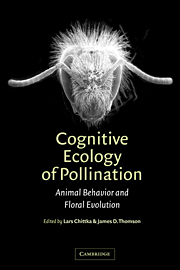Book contents
- Frontmatter
- Contents
- List of contributors
- Preface
- 1 The effect of variation among floral traits on the flower constancy of pollinators
- 2 Behavioral and neural mechanisms of learning and memory as determinants of flower constancy
- 3 Subjective evaluation and choice behavior by nectar-and pollen-collecting bees
- 4 Honeybee vision and floral displays:from detection to close-up recognition
- 5 Floral scent, olfaction, and scent-driven foraging behavior
- 6 Adaptation, constraint, and chance in the evolution of flower color and pollinator color vision
- 7 Foraging and spatial learning in hummingbirds
- 8 Bats as pollinators: foraging energetics and floral adaptations
- 9 Vision and learning in some neglected pollinators: beetles, flies, moths, and butterflies
- 10 Pollinator individuality: when does it matter?
- 11 Effects of predation risk on pollinators and plants
- 12 Pollinator preference, frequency dependence, and floral evolution
- 13 Pollinator-mediated assortative mating: causes and consequences
- 14 Behavioural responses of pollinators to variation in floral display size and their influences on the evolution of floral traits
- 15 The effects of floral design and display on pollinator economics and pollen dispersal
- 16 Pollinator behavior and plant speciation: looking beyond the “ethological isolation” paradigm
- Index
10 - Pollinator individuality: when does it matter?
Published online by Cambridge University Press: 13 August 2009
- Frontmatter
- Contents
- List of contributors
- Preface
- 1 The effect of variation among floral traits on the flower constancy of pollinators
- 2 Behavioral and neural mechanisms of learning and memory as determinants of flower constancy
- 3 Subjective evaluation and choice behavior by nectar-and pollen-collecting bees
- 4 Honeybee vision and floral displays:from detection to close-up recognition
- 5 Floral scent, olfaction, and scent-driven foraging behavior
- 6 Adaptation, constraint, and chance in the evolution of flower color and pollinator color vision
- 7 Foraging and spatial learning in hummingbirds
- 8 Bats as pollinators: foraging energetics and floral adaptations
- 9 Vision and learning in some neglected pollinators: beetles, flies, moths, and butterflies
- 10 Pollinator individuality: when does it matter?
- 11 Effects of predation risk on pollinators and plants
- 12 Pollinator preference, frequency dependence, and floral evolution
- 13 Pollinator-mediated assortative mating: causes and consequences
- 14 Behavioural responses of pollinators to variation in floral display size and their influences on the evolution of floral traits
- 15 The effects of floral design and display on pollinator economics and pollen dispersal
- 16 Pollinator behavior and plant speciation: looking beyond the “ethological isolation” paradigm
- Index
Summary
I have always regretted that I did not mark the bees by attaching bits of cotton wool or eiderdown to them with rubber, because this would have made it much easier to follow their paths.
Charles Darwin, cited by Freeman (1968)The symposium that stimulated this book arose from the editors' conviction that botanists interested in biotic pollination would benefit from a consideration of recent research on the behavior and the sensory capabilities of flower-visiting animals. We hoped to offer perspectives that would correct misapprehensions, enrich future work, and open new questions. In this chapter, we continue in this evangelistic vein by indulging in long-standing personal interests in the individuality of pollinating animals. Ignoring the uniqueness of individuals will invite regrets like those expressed by Darwin in reviewing his work on the flight patterns of male bumble bees. Although he investigated this question for several years, Darwin never published his observations. Might he have considered his failure to mark the bees a fatal flaw?
Our goals are to outline some of the insights that are made possible by treating pollinators as individuals, and to show possible pitfalls of not doing so. Some well-known conclusions regarding pollinator physiology and behavior can be given alternative interpretations by invoking individuality. We hope that this chapter will stimulate more systematic approaches to pollinator individuality.
- Type
- Chapter
- Information
- Cognitive Ecology of PollinationAnimal Behaviour and Floral Evolution, pp. 191 - 213Publisher: Cambridge University PressPrint publication year: 2001
- 28
- Cited by



